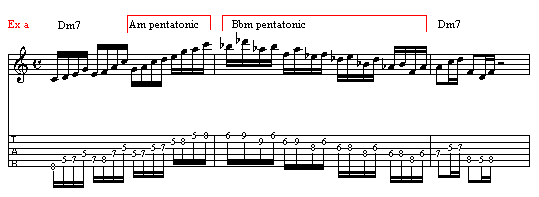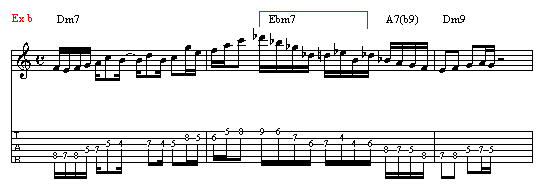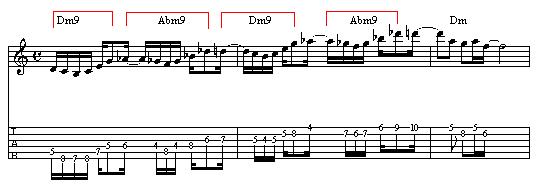Part One: Melody
Focuses on single note soloing. Learn how to effortlessly solo through complex chord changes.
Free Jazz Guitar Lessons with Chris Standring
Playing 'outside' is a great way to add the element of danger to a
guitar solo. It is usually understood as meaning outside of the
key center. However, the knack is to make it sound convincing as opposed
to making it seem like you are just playing a bunch of wrong notes.
The trick to making it really work is essentially; strong articulated
phrasing, knowledge of the harmony you decide to use and stepwise resolution.
If you are new to this I would advise you to keep your outside phrases
short and to the point. Long phrases require more conviction and a little
more experience. Harmonically, you can experiment with just about any
un-related key but you might want to start with the obvious at first,
to really get the hang of it. ie; up or down a half step.
The most important thing to work on is getting back to your home key
in the strongest, most effective way. Here you might focus on
1) Targeting home key chord tones,
2) Resolving home by step (that is, falling naturally on to strong,
essential chord tones) and
3) Stressing your home key by outlining a triad. In the following examples
I have used a D minor key throughout.
Example (b) shows how using a dominant phrase (in this case A7b9) effectively
gets you back to your home key.
Example (c) shows the "in-out-in-out" melodic idea where you
alternate an "in" phrase with an "out" phrase. In
this case I have chosen a tritone to play with but you could experiment
with just about anything. Again, the home key, when I finally get there,
is well and truly stressed. Have fun!



Free online jazz guitar lessons for beginners, intermediates and advanced.
Online jazz guitar instruction from recording artist Chris Standring
Join The Inside Track membership and get access to all Chris Standring's guitar instructional programs, all in one place.
It has been many years since the first edition of Play What You Hear (originally released in 2000). Now volume two is here with new ideas and concepts, complete with audio, video, traditional notation and TAB throughout. High resolution pdf available for printing the entire program. For intermediate and advanced players.
Focuses on single note soloing. Learn how to effortlessly solo through complex chord changes.
Focuses on chord melody. Learn new harmonic devices and understand chords in a whole new way.
Study Chris Standring's six recorded solos, transcribed with audio and high def video.
Copyright © PlayJazzGuitar.com - All Rights Reserved.